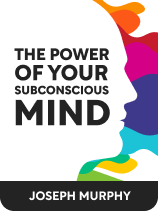

This article is an excerpt from the Shortform book guide to "The Power of Your Subconscious Mind" by Joseph Murphy. Shortform has the world's best summaries and analyses of books you should be reading.
Like this article? Sign up for a free trial here .
Is it possible to access the contents of your subconscious mind? How does your conscious mind interfere with your ability to access the subconscious?
Your subconscious mind is more accessible when you’re relaxed or asleep because your conscious mind is not interfering. When you’re awake and alert, you can’t help but think about and judge everything around you, blocking your access to the subconscious.
In this article, you’ll learn how to access your subconscious mind through relaxation.
Practice Relaxation
In his book The Power of Your Subconscious Mind, Joseph Murphy explains how to access your subconscious mind by toning down the activity in your conscious mind. Murphy argues that when you practice relaxation, you lull your conscious mind to sleep and have direct access to your subconscious mind. To illustrate how this works, Murphy touches upon how hypnotists induce their subjects into a relaxed state before they make suggestions—by preventing their subjects’ conscious minds from interfering, they ensure that their subjects will follow through with their suggestions.
For example, a hypnotist can make someone believe that a carrot is a chili pepper. When the person eats the carrot, she’ll react in the same way that she would if she had actually taken a bite out of a chili pepper—she’ll turn red in the face and desperately seek water to relieve the burning sensation in her mouth. She believes that the carrot is a chili pepper because her conscious mind isn’t interfering and arguing against the hypnotist’s suggestion.
| Hypnotism Encourages Your Conscious Mind to Detach From Your Experience In Psycho-Cybernetics, Maxwell Maltz also draws on the practice of hypnotism to argue that relaxation encourages your subconscious mind to accept new ideas. According to Maltz, your subconscious mind doesn’t know the difference between imagination and reality—it can only react (by creating changes in your nervous system) to what you imagine to be true. When your conscious mind is alert, your thoughts help your subconscious mind distinguish fact from fiction. For instance, in the example above, your conscious mind would step in and tell you that you’re eating a carrot. As a result, your subconscious mind would not cause your nervous system to heat up. But, by inducing your conscious mind into a state of complete relaxation, hypnotists take advantage of your subconscious mind’s inability to distinguish between imagination and reality. However, hypnotists don’t have complete control over you when you’re in this relaxed state. According to studies, the relaxation method hypnotists employ doesn’t cause your conscious mind to fall asleep. Instead, it encourages you to feel detached from your experiences. As a result of this detachment, your conscious mind disassociates from any problems or concerns and serves merely as a witness to the events that take place. In other words, your conscious mind is aware of what’s going on but doesn’t feel involved in the experience. Consequently, it doesn’t feel the need to interfere with thoughts that disrupt the experience. |
Set Intentions Before You Sleep
Since your subconscious mind is more receptive to your thoughts when your conscious mind is relaxed, Murphy recommends that you make the habit of thinking about what you want before you go to sleep. In addition, if you have problems that need solving, instruct your subconscious mind to come up with solutions while you sleep. According to Murphy, your subconscious mind will provide these solutions to you in the form of urges and inspiration when you awake.
(Shortform note: In Deep Work, Cal Newport backs up Murphy’s idea that sleep and relaxation help you to find solutions. Newport discusses the benefits of “productive meditation”—using your relaxation time as a constructive way to solve problems. He suggests that you’re more likely to do your best work when you alternate between periods of intense focus and relaxation. While you’re relaxing, your mind will work through the problems you’ve lined up for it and, without your conscious interference, can more quickly or creatively arrive at a solution.)
Pray for What You Want
Murphy claims that prayer is also an effective way to bypass your conscious mind to communicate your new thoughts directly to your subconscious mind. This is because he views prayer as a form of relaxation—he believes that your focus on what you’re praying for induces you into a relaxed state and silences your conscious mind.
Murphy suggests a simple prayer: Say specific words to generate the feeling of what you want. For example, you might talk about wealth, love, success, or health. These words allow you to avoid conflict in your conscious mind because you’re not giving it anything to question or contradict—instead of affirming that you are wealthy or healthy, you’re simply saying words that allow you to focus on what you want.
(Shortform note: A recent study into the effect of mantras confirms that repeating a single word stops your mind from wandering. Researchers used functional magnetic resonance imaging to examine the brain blood flow patterns of people who silently repeated a single word. The imaging showed a reduction of activity across the brain, primarily in the area of the brain that gives rise to internal thoughts—this is the area that generates your self-critical thoughts. So, while there isn’t any evidence to support the argument that repeating the word “wealth” will make you wealthy, there is proof that it will calm down your internal dialogue which will benefit you.)

———End of Preview———
Like what you just read? Read the rest of the world's best book summary and analysis of Joseph Murphy's "The Power of Your Subconscious Mind" at Shortform .
Here's what you'll find in our full The Power of Your Subconscious Mind summary :
- How your subconscious mind creates your life experiences
- How to improve your life experiences by using your conscious mind to influence your subconscious
- Why we're all designed to experience happiness






